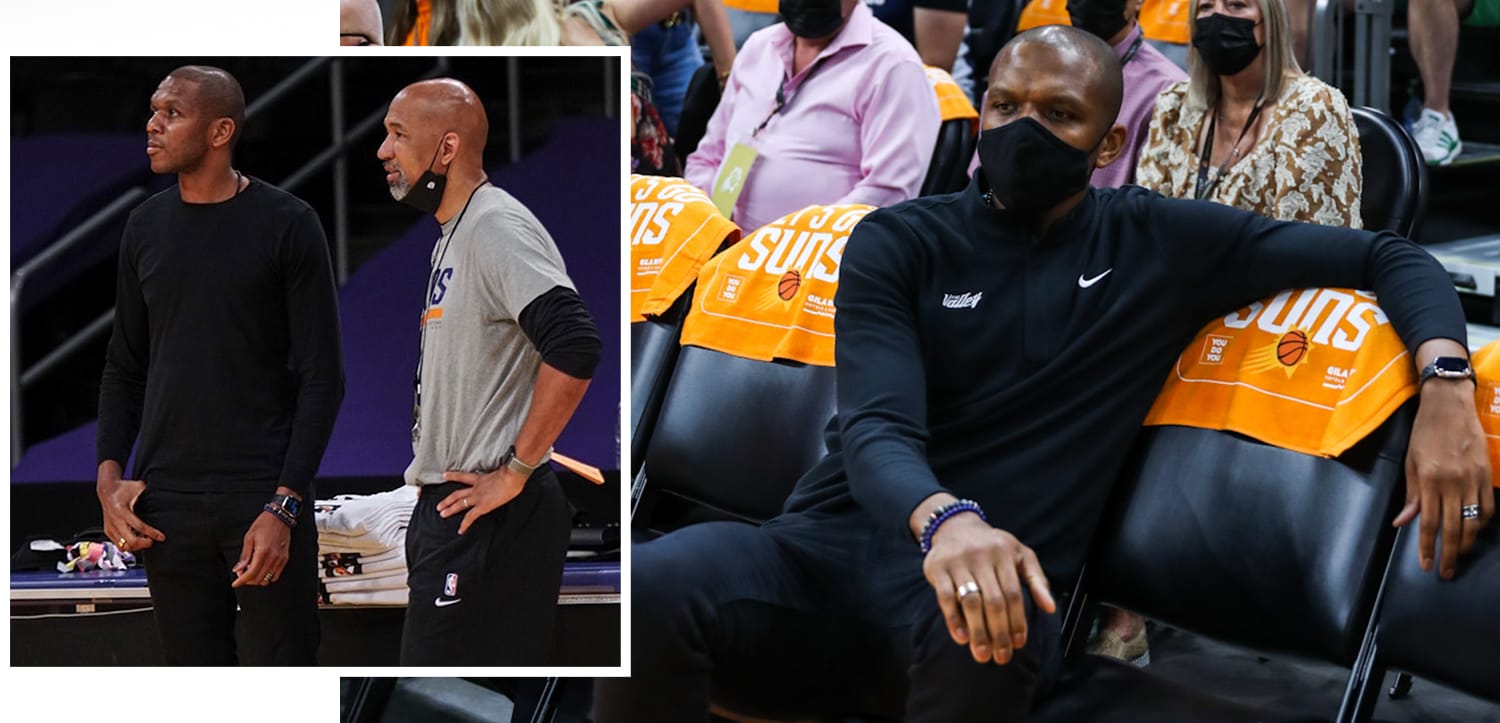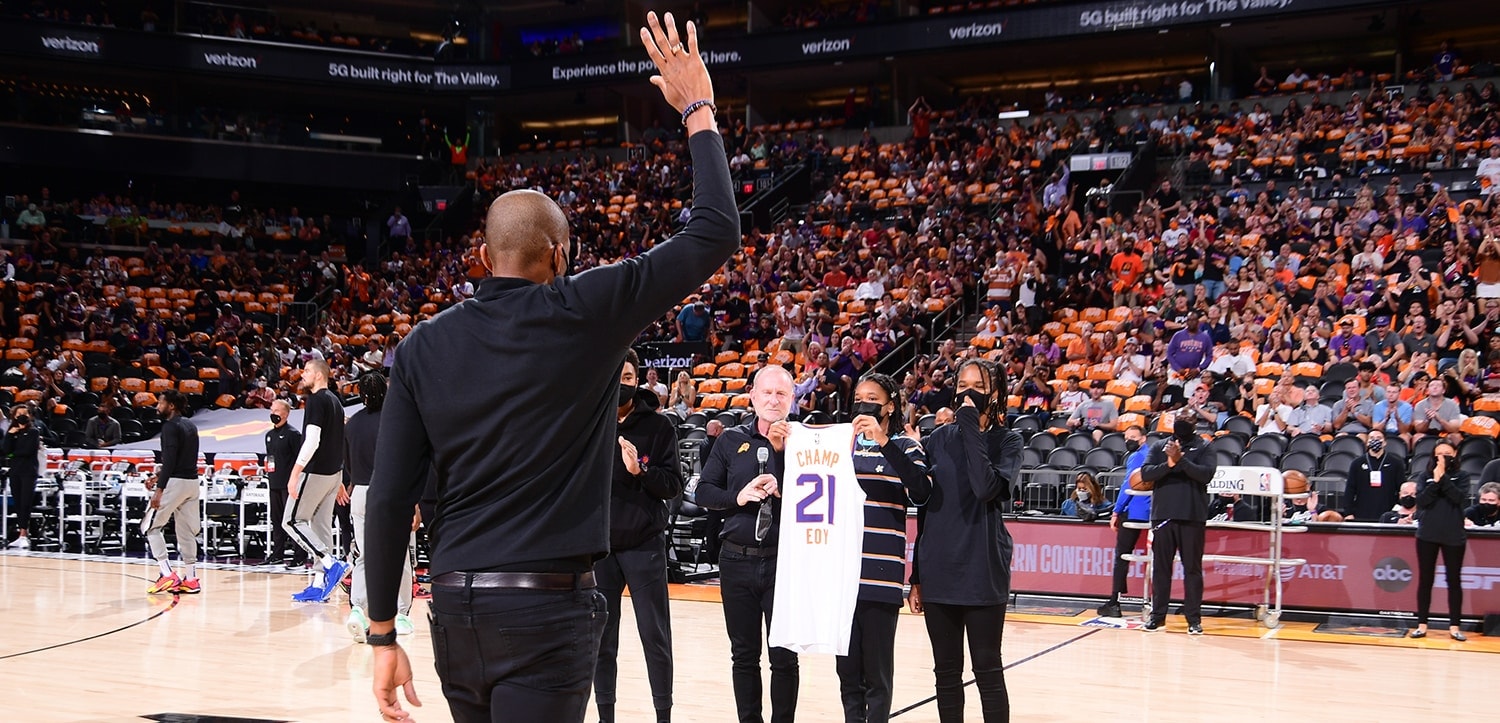On June 20, 2019, Cam Johnson celebrated inside his family’s Pittsburgh-area home as his name was called as the 11th overall pick in the NBA Draft.
The most optimistic outsider was stunned, as evidenced by the “Wow, bro!” viral video from Coby White, Johnson’s former North Carolina teammate and close friend. The most pessimistic outsider panned that move along with newly promoted Phoenix Suns general manager James Jones’ entire draft night, which also included trading T.J. Warren to Indiana for cash considerations, acquiring Dario Šarić as part of the deal that gave the Suns Johnson’s draft rights and trading for Aron Baynes and the draft pick that became Ty Jerome in exchange for a first-round pick.
Two years later to the day, Suns Managing Partner Robert Sarver and Jones’ three children surprised him at midcourt with an ideal Father’s Day present: the news that he had been voted NBA Executive of the Year by his peers. Phoenix players stopped their pregame warmups to applaud the architect who built this Suns team now three wins away from the NBA Finals. Johnson then went on to record 12 points, four rebounds and two steals in Phoenix’s Game 1 victory over the Clippers.
This uncanny timing — which is only possible due to an altered calendar to complete this pandemic season — presents a perfect opportunity to look back at how that draft night shaped the Suns’ direction and impressive resurgence under Jones.
“That journey where when I was first drafted here, it was like, 'Oh man, this team is terrible. I was a terrible pick. This team was destined for failure,'” Johnson recently recalled, “then to get to this point now, going into the Western Conference Finals, it's fun. “It shows the trust and the faith and the confidence we have in one another.”
Jones took over as interim co-general manager just before the 2018-19 season began. His in-season moves during those first few months included trading Trevor Ariza to Washington for Kelly Oubre Jr. and dealing Ryan Anderson to Miami for Tyler Johnson.
After being officially promoted to general manager following the season, Jones’ first major move was hiring Monty Williams as head coach. But draft night was Jones’ first opportunity to make significant roster tweaks.
The cash considerations that came back in the Warren trade were used to re-sign Oubre and sign starting point guard Ricky Rubio, who were important contributors during their time with Phoenix before becoming the centerpieces of the blockbuster trade for Chris Paul. Another move that helped free up some salary for those signings occurred later that summer, when Jones traded Josh Jackson, De’Anthony Melton and two second-round draft picks to Memphis for Jevon Carter, who has become a fan favorite because of his defensive tenacity, tireless work ethic and passionate support from the bench when he’s not in the rotation.
Baynes also provided value with his toughness, experience and 3-point shooting last season, particularly during Deandre Ayton’s 25-game suspension.
Snap judgements and instant analysis are commonplace in a passionate, 24/7 sports landscape. But Jones’ plan has been methodically deliberate since his interim season. His goal has been to find “Suns fits,” or players with the skill sets, work habits and personality that can immediately raise the team’s floor and gel with a positive culture.

Johnson embodied that vision. His long-range shooting would immediately translate at the NBA level. The Suns knew he was a high-character man because of his past relationship with Vice President of Basketball Operations Jeff Bower. The Suns trusted Johnson’s hip injury that required surgery in college had healed.
And Phoenix believed Johnson would develop into more than a shooter. During his first two NBA seasons, Johnson has flashed the athleticism to elevate for dunks — including a key fourth-quarter slam during Sunday’s victory — as well as the footwork and length to guard multiple positions.
The Suns won 34 games the season after removing Jones’ interim tag, including an 8-0 run in the Orlando Bubble that raised eyebrows around the league. Jones then parlayed that momentum into a franchise-changing offseason.
The trade for Paul, an 11-time All-Star and one of the best point guards of all time, was the obvious headliner. Phoenix also signed rugged veteran wing Jae Crowder, who had just come off an NBA Finals run with Miami. The Suns brought back Šarić, Carter and Frank Kaminsky because Williams calls them “culture-drivers.” They gave Cameron Payne a shot right before the Bubble, then picked up his team option for 2020-21. They acquired Torrey Craig for cash considerations in March, and he immediately became a rotation contributor. They filled out the roster with E’Twaun Moore and Langston Galloway, who have been lauded for the professionalism, locker-room leadership and ability to step in whenever needed (see: Moore playing 11 minutes Sunday while Paul was out due to health and safety protocols).
The result: Phoenix finished with the NBA’s second-best regular-season record and clinched a playoff berth for the first time since 2010. The Suns ranked in the top 7 in the NBA in offensive and defensive rating, using a style predicated on sharing the ball and playing with relentless force. They have now won eight consecutive playoff games to extend a franchise record, knocking out the defending-champion Lakers in the first round, sweeping the Denver Nuggets in the Western Conference Semifinals and taking Game 1 of their series against the Clippers. “Team-wide, I really, really love our group,” Johnson said. “ … I love this team. I love who we have on the court. I love playing with these guys.”
Natural outside skepticism was perhaps expected when Sarver elevated Jones to the Suns’ top personal decision-maker. He was a role player on championship teams, then quickly rose up Phoenix’s front office. He took over a franchise that had endured immense recent turnover and on-court struggles, winning only 19 games in 2018-19.
But June 20, 2019 helped launch the construction of the Suns’ roster now up 1-0 in the Western Conference Finals.
And on June 20, 2021, Jones was named NBA Executive of the Year.
What a difference two years can make.
“He’s a big reason why we’re having the success, because of the team that he’s put together and the character of the players and the talent that he’s assembled,” Williams said of Jones. “Just happy for him. He’s changed this thing in a short period of time.“ … I know that had to be a thrill for him (to be named Executive of the Year). He won’t admit it, but I’m sure he was close to tears.”

